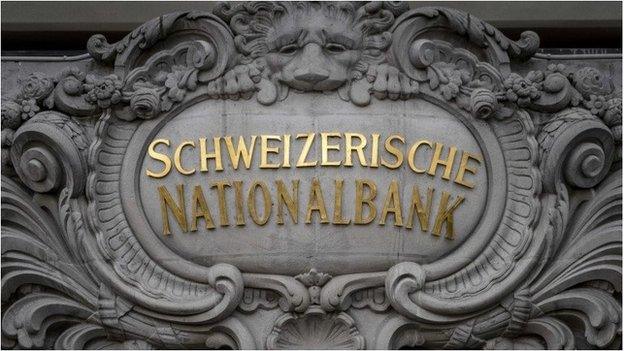Why the Swiss franc can't escape being a safe haven
- Published
- comments

"You can't bet against a central bank" was what I heard frequently when the Swiss National Bank rather successfully maintained a cap on the Swiss franc of 1.20 to the euro for three years.
But, now dramatically, it has surprised markets by scrapping the cap and unsurprisingly, the franc has soared by nearly 30%.
Of course, central banks have found it hard to defend a peg. But, the SNB was able to do so as it was helped by deflation, or falling prices.
Typically, a central bank would essentially buy up the other currency (in this case, the euro) to maintain the peg.
To prevent those massive purchases from becoming inflationary, a central bank would "sterilize" the buys by taking in the equivalent currency from the economy.
It usually doesn't work very well, and countries end up raising interest rates to attract demand for its currency, which hurts economic growth. So, a peg is usually hard to defend.
Pressure
But, Switzerland has been coping with deflationary rather than inflationary pressures. The latest figures show that CPI declined by 0.3% in December, the steepest fall in a year.
So, there hasn't been a need to be concerned about inflation and that's been the case during the past few years.
It gave it more scope to intervene and the SNB managed to maintain a cap despite market pressures. Recall, the cap was put in place three years ago to prevent a massive rise in the currency from investors fleeing the euro crisis.
But, there are new pressures now on the currency.
Further falls
In a statement explaining its policy, the SNB points to divergence among major economies; in particular, the weakening euro which has hit about the lowest level since its inception.
With anticipated cash injections by the ECB, the euro is expected to depreciate more against the US dollar and as the franc is pegged to the euro, the Swiss franc is weakening versus the dollar too.
So, they conclude that there is no longer "exceptional overvaluation" of the Swiss franc that justified the minimum exchange rate.
But, the reaction from markets is to push up the value of the franc since the appreciation pressures are still there.
As Greece could precipitate another phase of the euro crisis, some $1.2 trillion of eurozone government bonds have negative yields that reflect a search for safe havens.
Switzerland is still the safe haven place in Europe to move money that is outside the eurozone. Its own negative deposit rates haven't been enough to deter money inflows.
Sensible?
And, if the ECB does undertake QE as many expect, then the euro will depreciate further against the franc.
It would lead to a further sizeable expansion of the SNB balance sheet, which is already large. The SNB foreign exchange reserves is at a record 495bn Swiss francs with large portions held in euros and dollars.
The SNB is still running a profit on its foreign exchange positions, but volatility can have a significant impact on its profit distribution.
For instance, when gold prices fell by 30% and caused 9bn francs of losses last year, it led to the scrapping of an annual payment of 1bn francs to its shareholders which are Switzerland's 26 cantons.
The cantons are pushing for a higher payment now to make up for the shortfall.
We'll hear more from SNB chairman Thomas Jordan later today about their reasoning.
Once markets settle, it may well seem like the sensible decision, given what's forthcoming with monetary easing in the eurozone.
But, for now, one thing that always causes market jitters is an unexpected move by a central bank.
And the SNB has certainly done that today.